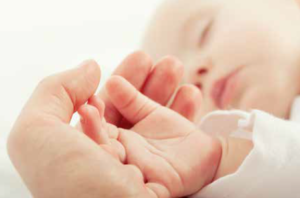Paediatric sleep study
What is it?
What is it?Polysomnography is a sleep study that involves one overnight stay for your baby. During this study, sleep, heart rhythm, breathing and oxygen saturation of the blood are checked. It is a completely pain-free test that uses external electrodes.
A sleep study is preferably done from the age of six weeks. If your child was born prematurely, the six weeks are counted from the expected delivery date. Performing the study before that is not meaningful, since breathing and heart rhythm may still be irregular due to immaturity.
Test procedure
Test procedureProcedure
- The sleep study takes place at the Paediatrics Department. You can stay overnight with your baby. You will be provided with breakfast on the ward in the morning.
- The study starts around 9pm and finishes at 6am.
- We try to ensure that your baby sleeps at least six hours. That is why it is necessary to leave the baby in the cot as much as possible.
- Only external electrodes and sensors are used. The electrodes are connected to a portable device. This enables you to pick up the baby to feed them, change their nappy, etcetera. More information about these electrodes can be found in the leaflet below.
Things to think about
- To allow for a correct interpretation of the test, your child must be in good health during the sleep study. If your child shows symptoms of a cold or other illness in the week before the study, please contact the paediatrician. The physician will decide whether to go ahead with the study or postpone it.
- On the day of admission, do not use any oil-based products, body lotion or creams to prevent the electrodes from slipping off during the study.
Results
ResultsThe result of the study cannot be communicated immediately. Once the sleep study is completed, we need to check and interpret all recordings first. You will be contacted within one week to discuss the results.
Leaflet
LeafletSee the leaflet below for more information.
Only available in Dutch:

Polysomnografie
DownloadCentres and specialist areas
Centres and specialist areasLatest publication date: 16/05/2024




